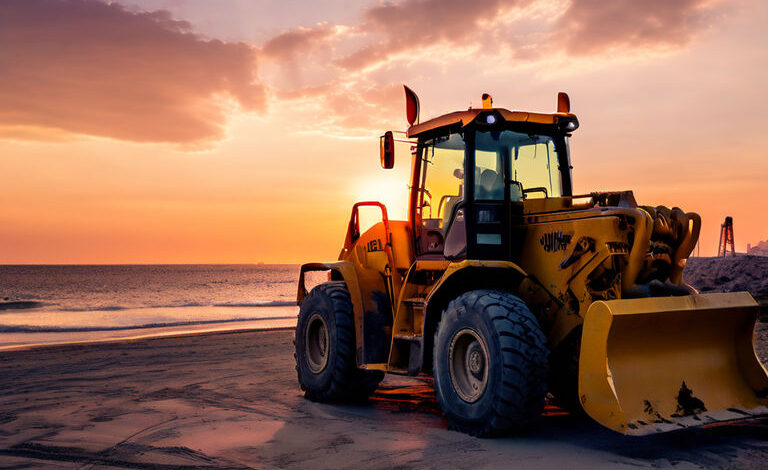Safeguarding Your Machine Battery During Summer Heat

Owners of secondhand construction machines, such as Escorts Construction Equipment, are generally concerned about the harm that winter’s cold may cause to their machinery. Yet, the summer heat may also be extremely harmful to machine batteries. The deterioration is frequently overlooked until the battery is forced to work harder in cooler conditions. Much of the degradation happens in June, July, and August.
As a result, it is essential to check battery condition throughout the year. And also take precautions during the summer to avoid unanticipated problems when winter approaches. Proper storage and routine inspection can assist in reducing the impact of severe temperatures on your apparatus.
How Heat Damages Batteries?
During the summer, construction equipment typically starts more easily, so the damage to the battery isn’t as apparent. However, machine operators might need to realize that the battery deteriorates more quickly in the heat. High temperatures cause lead-acid battery current collectors to degrade faster and corrode during charging, weakening the batteries over time.
Heat also shortens a battery’s life due to accelerated sulfation. Sulfation is the process where lead sulfate crystals form on the battery’s electrodes as it discharges. Under normal conditions, immediate recharging prevents these crystals from hardening. However, in the heat, these crystals form more quickly and become harder to recharge if they are not addressed after some time. This process significantly reduces the battery’s ability to hold a charge.
Parasitic loads, which are small currents drawn by a machine’s electronic components even when it’s not in use, also contribute to faster battery deterioration in the heat. Although these loads are minimal, their impact is compounded by high temperatures, further decreasing the battery’s lifespan. The combination of heat and parasitic loads means that batteries are under constant stress, even when the machinery is idle. This continuous strain accelerates wear and tear. This makes regular maintenance and protective measures even more critical during the summer months.
Shortened Battery Life Due to Heat
Battery life is also shorter in hotter temperatures. The rate of sulfation increases with heat. Sulfation refers to the development of lead sulfate crystals, which form around the electrodes as the battery discharges. Normally, this isn’t an issue if the battery is recharged immediately. However, if recharging is delayed, the lead sulfate turns into harder-to-charge crystals.
Sulfation also accelerates due to parasitic loads, which are small currents that the battery delivers to the electronic components of a machine. Although these loads are minimal, they combine with heat to reduce battery life.
Recommendations for Protecting Your Machine Battery
- Park Equipment in the Shade
Keep your equipment out of sunlight at all times to extend its battery life. When not in use, keep the equipment in a sheltered or protected storage place, including a garage. Storing machinery in a cool, shaded place may increase its longevity and efficiency. Direct sunshine and high temperatures can destroy batteries faster, diminishing their overall performance and lifetime.
In addition, employing protective coverings helps shelter the equipment from damaging UV rays, increasing its durability. Regular maintenance and suitable storage procedures are critical for retaining the performance and worth of your gear.
- Routine Battery Maintenance
Regularly check the health of your battery as part of routine equipment maintenance. Ensure the battery is fully and properly charged before heavy use in the hotter months. Avoid relying solely on the alternator, as this can stress the alternator and lead to early failure. Use a battery charger as necessary, and ensure all connections are clean and tight to provide higher current and long-term performance.
- Use AGM Batteries
Whenever possible, use absorbed glass mat (AGM) batteries. These low-maintenance alternatives to lead-acid batteries are less affected by sulfation and parasitic loads. AGM batteries can sit in storage for longer periods without adverse effects. They are sealed and leak-proof, ideal for equipment that uses a lot of power for components such as mirrors, heating, and air conditioning.
- Keep Machinery Active
Keep your machinery active to ensure optimal performance. Avoid leaving your equipment idle for lengthy periods since this might create parasitic loads that drain the battery faster. Regularly utilizing your gear helps to keep it working and minimizes battery degeneration. Routine maintenance sessions can keep the equipment in excellent operating condition and extend its life.
Furthermore, regular checks and maintenance during these sessions can detect possible problems early on, allowing for prompt fixes and avoiding long-term harm. Keeping your machinery operational is critical to its dependability and lifetime.
- Turn Off Electronic Systems
Turn off all electronic systems in your machinery to prevent unnecessary battery drain. Electronics are the largest source of parasitic loads, so it’s crucial to ensure they are completely shut down when you exit the machine. This practice helps prevent the inactive engine from degrading your battery. Turning off lights, screens, and other electrical components may dramatically increase battery life and keep your equipment running efficiently.
Consider adding battery disconnect switches to totally turn off electricity while the gear is not being used. Regular inspections and updates to your electrical systems can also assist in reducing parasitic loads and extend the life of your machinery’s battery.
Conclusion
As the owner or operator of secondhand heavy equipment, such as a Wheel Loader, taking the proper measures during the scorching summer months is critical to protecting your equipment’s battery. These measures include keeping equipment out of direct sunlight, doing regular battery maintenance, using AGM batteries wherever feasible. Also, keeping equipment active, and remembering to turn off electrical systems.
Implementing these suggestions will help maintain the long-term health of the equipment’s battery. By taking proactive steps to care for your Wheel Loader’s battery, you may avoid heat damage and maximize the machine’s life, assuring consistent performance all year.



